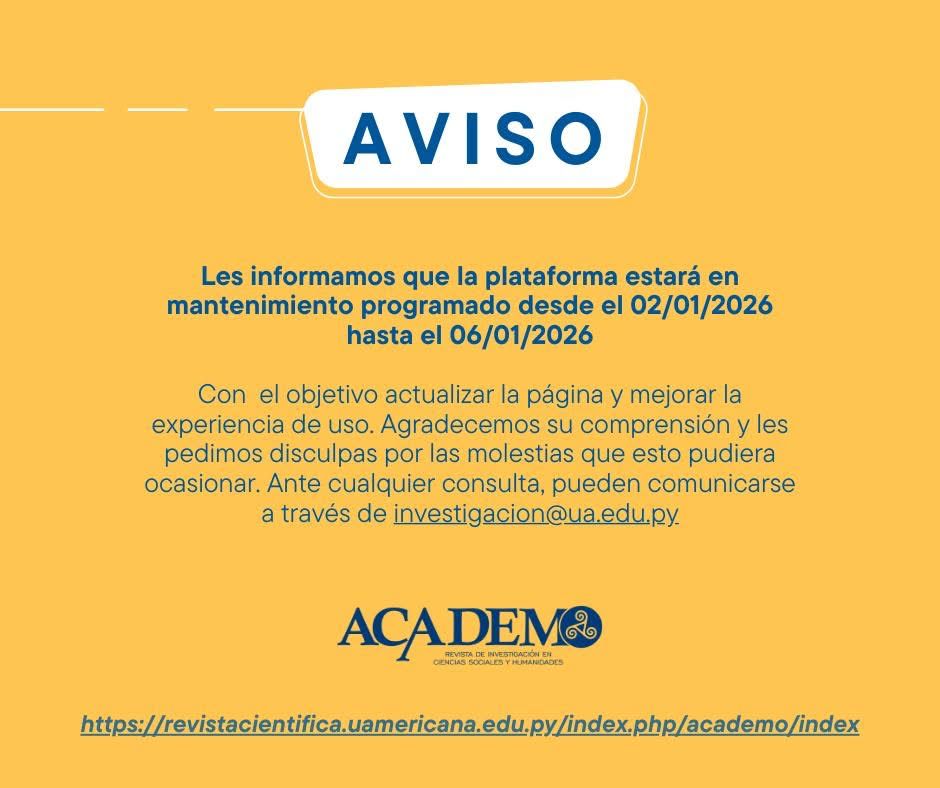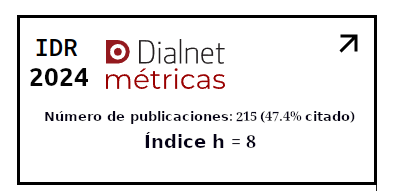Preliminary evidence of validity and reliability of the Self-Compassion Scale - Short Form in Peruvian adolescents
Keywords:
self-compassion, confirmatory factor analysis, teenagers, validity, reliabilityAbstract
The present study aimed to analyze the internal structure and determine the degree of reliability of the Self-Compassion Scale – Short Form (SCS-SF) in Peruvian adolescents. For this, we had a sample of 365 adolescents with an age range of 12 to 18 years (M = 15.22; SD = 1.29). The results of the confirmatory factor analysis show adequate fit indices in the two-factor model with correlations in items 5,10,11 and 12 (CFI = .92, TLI = .90, RMSEA = 0.062, SRMR = .060). Likewise, the reliability values were acceptable for the dimension self-compassion (α=.71; H=.75) and self-criticism (α=81; H=.83). It is concluded that the SCS-SF is a brief and useful instrument that presents adequate psychometric evidence to measure the degree of understanding and warmth of people with themselves when they experience situations of suffering and failure.
Downloads
References
Aiken, L. R. (1980). Content validity and reliability of single items or questionnaires. Educational and Psychological Measurement, 40(4), 955–959. https://doi.org/10.1177/001316448004000419
Babenko, O., y Guo, Q. (2019). Measuring self-compassion in medical students: factorial validation of the Self-Compassion Scale–Short Form (SCS-SF). Academic Psychiatry, 43(6), 590–594. https://doi.org/10.1007/s40596-019-01095-x
Baer, R. A., Lykins, E. L. B., y Peters, J. R. (2012). Mindfulness and self-compassion as predictors of psychological wellbeing in long-term meditators and matched nonmeditators. Journal of Positive Psychology, 7(3), 230–238. https://doi.org/10.1080/17439760.2012.674548
Barry, C. T., Loflin, D. C., y Doucette, H. (2015). Adolescent self-compassion: Associations with narcissism, self-esteem, aggression, and internalizing symptoms in at-risk males. Personality and Individual Differences, 77, 118–123. https://doi.org/10.1016/j.paid.2014.12.036
Bluth, K., y Blanton, P. W. (2014). Mindfulness and Self-Compassion: Exploring pathways to adolescent emotional well-being. Journal of Child and Family Studies, 23(7), 1298–1309. https://doi.org/10.1007/s10826-013-9830-2
Bluth, K., y Blanton, P. W. (2015). The influence of self-compassion on emotional well-being among early and older adolescent males and females. Journal of Positive Psychology, 10(3), 219–230. https://doi.org/10.1080/17439760.2014.936967
Brown, T. A. (2015). Confirmatory factor analysis for applied research (Second Edit).
Castilho, P., Pinto-Gouveia, J., y Duarte, J. (2015). Evaluating the multifactor structure of the long and short versions of the self-compassion scale in a clinical sample. Journal of Clinical Psychology, 71(9), 856–870. https://doi.org/10.1002/jclp.22187
Chen, G., He, J., Cai, Z., y Fan, X. (2020). Perceived parenting styles and body appreciation among chinese adolescents: Exploring the mediating roles of dispositional mindfulness and self-compassion. Children and Youth Services Review, 119, 105698. https://doi.org/10.1016/j.childyouth.2020.105698
Cho, E. (2016). Making reliability reliable. Organizational Research Methods, 19(4), 651–682. https://doi.org/10.1177/1094428116656239
De Souza, L., y Hutz, C. (2016). Adaptation of the self-compassion scale for use in Brazil: Evidences of construct validity. Temas Em Psicologia, 24(1), 159–172. https://doi.org/10.9788/TP2016.1-11
Dominguez-Lara, S. A. (2016). Evaluación de la confiabilidad del constructo mediante el coeficiente H: Breve revisión conceptual y aplicaciones. Psychologia, 10(2), 87–94. https://doi.org/10.21500/19002386.2134
Ferrando, P. J., y Anguiano-Carrasco, C. (2010). El análisis factorial como técnica de investigación en psicología. Papeles del Psicólogo, 31(1), 18–33. Recuperado de http://www.papelesdelpsicologo.es/pdf/1793.pdf
Forero, C. G., Maydeu-Olivares, A., y Gallardo-Pujol, D. (2009). Factor analysis with ordinal indicators: A Monte Carlo Study Comparing DWLS and ULS Estimation. Structural Equation Modeling: A Multidisciplinary Journal, 16(4), 625–641. https://doi.org/10.1080/10705510903203573
Galla, B. M. (2016). Within-person changes in mindfulness and self-compassion predict enhanced emotional well-being in healthy, but stressed adolescents. Journal of Adolescence, 49, 204–217. https://doi.org/10.1016/j.adolescence.2016.03.016
Garcia-Campayo, J., Navarro-Gil, M., Andrés, E., Montero-Marin, J., López-Artal, L., y Demarzo, M. M. (2014). Validation of the Spanish versions of the long (26 items) and short (12 items) forms of the Self-Compassion Scale (SCS). Health and Quality of Life Outcomes, 12(1), 4. https://doi.org/10.1186/1477-7525-12-4
Gill, C., Watson, L., Williams, C., y Chan, S. W. Y. (2018). Social anxiety and self-compassion in adolescents. Journal of Adolescence, 69, 163–174. https://doi.org/10.1016/j.adolescence.2018.10.004
Hayes, J. A., Lockard, A. J., Janis, R. A., y Locke, B. D. (2016). Construct validity of the Self-Compassion Scale-Short Form among psychotherapy clients. Counselling Psychology Quarterly, 29(4), 405–422. https://doi.org/10.1080/09515070.2016.1138397
Hu, L. T., y Bentler, P. M. (1999). Cutoff criteria for fit indexes in covariance structure analysis: Conventional criteria versus new alternatives. Structural Equation Modeling, 6(1), 1–55. https://doi.org/10.1080/10705519909540118
Kemper, K. J., Mo, X., y Khayat, R. (2015). Are mindfulness and self-compassion associated with sleep and resilience in health professionals? Journal of Alternative and Complementary Medicine, 21(8), 496–503. https://doi.org/10.1089/acm.2014.0281
Kotera, Y., y Sheffield, D. (2020). Revisiting the Self-compassion Scale-Short Form: Stronger Associations with Self-inadequacy and Resilience. SN Comprehensive Clinical Medicine, 2(6), 761–769. https://doi.org/10.1007/s42399-020-00309-w
López, A., Sanderman, R., Smink, A., Zhang, Y., van Sonderen, E., Ranchor, A., y Schroevers, M. J. (2015). A reconsideration of the Self-Compassion Scale’s Total Score: Self-Compassion versus Self-Criticism. PLOS ONE, 10(7), e0132940. https://doi.org/10.1371/journal.pone.0132940
Mehr, K. E., y Adams, A. C. (2016). Self-Compassion as a mediator of maladaptive perfectionism and depressive symptoms in college students. Journal of College Student Psychotherapy, 30(2), 132–145. https://doi.org/10.1080/87568225.2016.1140991
Muris, P., Meesters, C., Pierik, A., y de Kock, B. (2016). Good for the Self: Self-compassion and other self-related constructs in relation to symptoms of anxiety and depression in non-clinical youths. Journal of Child and Family Studies, 25(2), 607–617. https://doi.org/10.1007/s10826-015-0235-2
Neff, K. (2003a). Self-Compassion: An alternative conceptualization of a healthy attitude toward oneself. Self and Identity, 21(2), 85–101. https://doi.org/10.1080/15298860390129863
Neff, K. (2003b). The development and validation of a scale to measure self-compassion. Self and Identity, 2(3), 223–250. https://doi.org/10.1080/15298860309027
Neff, K. D. (2016). The self-compassion scale is a valid and theoretically coherent measure of self-compassion. Mindfulness, 7(1), 264–274. https://doi.org/10.1007/s12671-015-0479-3
Nunnally, J. C., y Bernstein, I. H. (1994). Psychometric theory (Third edit). McGraw-Hill, Inc.
Pullmer, R., Chung, J., Samson, L., Balanji, S., y Zaitsoff, S. (2019). A systematic review of the relation between self-compassion and depressive symptoms in adolescents. Journal of Adolescence, 74(June), 210–220. https://doi.org/10.1016/j.adolescence.2019.06.006
R Core Team. (2019). A language and environment for statistical computing. R Foundation for Statistical Computing.
Raes, F., Pommier, E., Neff, K. D., y Van Gucht, D. (2011). Construction and factorial validation of a short form of the Self-Compassion Scale. Clinical Psychology and Psychotherapy, 18(3), 250–255. https://doi.org/10.1002/cpp.702
Rhemtulla, M., Brosseau-Liard, P. É., y Savalei, V. (2012). When can categorical variables be treated as continuous? A comparison of robust continuous and categorical SEM estimation methods under suboptimal conditions. Psychological Methods, 17(3), 354–373. https://doi.org/10.1037/a0029315
Sun, R., Ren, Y., Li, X., Jiang, Y., Liu, S., y You, J. (2020). Self-compassion and family cohesion moderate the association between suicide ideation and suicide attempts in Chinese adolescents. Journal of Adolescence, 79(December 2019), 103–111. https://doi.org/10.1016/j.adolescence.2019.12.010
Sutton, E., Schonert-Reichl, K. A., Wu, A. D., y Lawlor, M. S. (2018). Evaluating the reliability and validity of the self-compassion scale short form adapted for children ages 8–12. Child Indicators Research, 11(4), 1217–1236. https://doi.org/10.1007/s12187-017-9470-y
Tavakol, M., y Dennick, R. (2011). Making sense of Cronbach’s alpha. International Journal of Medical Education, 2, 53–55. https://doi.org/10.5116/ijme.4dfb.8dfd
Uršič, N., Kocjančič, D., y Žvelc, G. (2019). Psychometric properties of the Slovenian long and short version of the Self-Compassion Scale. Psihologija, 52(2), 107–125. https://doi.org/10.2298/PSI180408029U
World Medical Association. (2013). World medical association declaration of Helsinki ethical principles for medical research involving human subjects. Clinical Review & Education, 310(20), 2191–2194. https://doi.org/10.1001/jama.292.11.1359
Yang, Y., Kong, X., Guo, Z., y Kou, Y. (2021). Can Self-compassion promote gratitude and prosocial behavior in adolescents? a 3-year longitudinal study from China. Mindfulness, 1–10. https://doi.org/10.1007/s12671-021-01605-9










